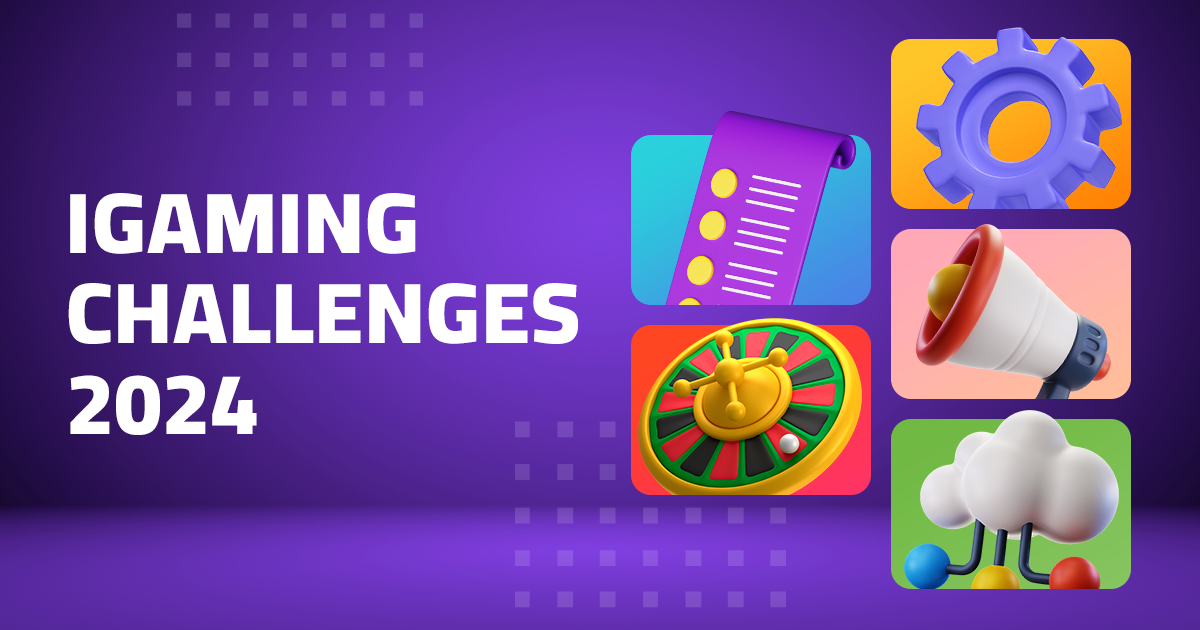
2024 iGaming Challenges: Threats or Opportunities?
As the excitement of the end of 2023 settles, the iGaming community shifts its focus to trends like cryptocurrencies or casino streaming shaping 2024. While adhering to mainstream tendencies remains a secure and voluntary choice for online casinos and gaming providers, BGaming invites you to delve into 5 challenges our industry should overcome this year and turn them into chances for growth and success.
Discover iGaming background
The global online gambling market witnessed remarkable growth in the previous year, achieving a compound growth rate of 9,3%. It rose from around $81,08 billion in 2022 to approximately $88,65 billion in 2023, according to the Online Gambling Global Market Report 2023 by Research & Market. Predictions indicate a continued upward trajectory, with the market anticipated to reach $125,6 billion by 2027. As this tendency persists, online operators face the challenge of securing favorable positions in the fiercely competitive iGaming arena.
BGaming has conducted extensive research to inform you of the difficulties awaiting us. Furthermore, we’ll shed light on the positive outcomes the industry can derive from these challenges. Let’s start!
Adapting legal landscapes
Navigating iGaming legal regulations proves to be a significant challenge in 2024, requiring operators to tailor their activities to individual countries’ frameworks. This complex and long process can create barriers to market entry and increase operational costs due to the need for local compliance strategies.
On the other hand, the evolving regulatory environment brings opportunities for market expansion and legitimization of the iGaming industry. In 2023, Brazil joined regulated iGaming, reflecting a broader trend towards structured markets. This commitment to a safe and fair gaming ambiance attracts more players to online casinos. Clear regulations can also improve the investment climate by reducing ambiguity and potential legal pitfalls, particularly in promising regions like Latin America, North America, and Europe.
Prioritizing responsible gaming
In 2024, player safety takes center stage in the iGaming industry. This trend urges operators and providers to integrate effective protection tools without compromising the gaming experience. Navigating regulatory pressures, public scrutiny, and the ethical duty of safeguarding players are among our responsibilities. This may involve investments in technology and personnel to monitor and support at-risk individuals.
Now, let’s take a look at the advantages of promoting responsible gaming:
- Enhanced operator reputation
- Higher trust and loyalty among players
- Standing out in competitive markets
In essence, emphasizing user well-being contributes to the players’ perception of operators’ reliability, potentially leading to higher retention and attracting a broader player base.
Keeping up with technology
The iGaming experience undergoes constant transformation with the advent of technologies like 5G, AR, and VR. However, BGaming recognizes an emerging concern with artificial intelligence (AI) due to data privacy and security, over-reliance on automation, ethical concerns, etc. In 2024, a serious challenge lies ahead for our community — mastering the art of balancing the benefits and risks of AI.
Nonetheless, game providers successfully integrated AI into game development in 2023. From coding to generating graphics, the tool can create content highly similar to manually crafted games.
Can you tell which of the following games were made with AI?
- NetGaming [Wild Buffalo Bonanza X Lucky Vault]

- BGaming [Alien Fruits X Gemhalla]

- Endorphina [Joker Ra slot X Silk Road]

AI tools can help to produce impressive games and personalize gaming experiences according to individual player preferences. There’s no doubt that this instrument will shape iGaming in 2024.
Building online communities

In the intense competition for user attention, the industry focuses on community-building strategies as a key differentiator. This involves establishing virtual gaming spaces that serve as hubs for interaction, allowing players to connect, share experiences, and cultivate relationships beyond the games. This tendency underscores a shift towards a more socially connected experience. It recognizes that the future of iGaming lies not only in the games themselves but in the ability to shape a more immersive and interactive gaming environment.
Scatters Club stands as a great example, with 7,000+ members. Here, players and streamers worldwide participate in tournaments, game tests, and various activities within its Discord channel. While nurturing such a community is a resource-intensive and energy-consuming process, the benefits are impressive. This approach is designed to foster long-term player engagement and instill a sense of belonging to a collective of like-minded people.
Using big data
The number of games is rapidly increasing each day. Operators and providers need to elevate the quality of their games and surprise the most experienced players with something new to be competitive in the market. Another rising challenge comes to the forefront – analyzing vast amounts of player data and behavior to create captivating content.
Recently, BGaming and Casinolytics made waves by releasing the industry-first slot fully based on data – Aztec Clusters. Every game detail, from innovative mechanics to the timing of features, was meticulously designed to evoke the emotions players and streamers seek in gaming. In the first week after its release, the game generated much hype, with many online streams showing players’ wins and emotions. As a result, Aztec Clusters rose to become one of the top 5 most-streamed games by airtime.
The more insights you gather about your audience, the more personalized games you can add to your portfolio, consequently increasing your GGR.
In addition, BGaming recognizes the importance of scalable content deployment through API integration for casino games. This strategic capability empowers partners to rapidly integrate new titles, leverage real-time game features, and ensure seamless compatibility across platforms—accelerating time-to-market and enhancing player engagement.
Final word
In summary, although the iGaming industry will encounter many challenges in 2024, ranging from regulatory hurdles to technological integration, these obstacles simultaneously offer substantial opportunities for growth and innovation. Skillfully navigating these difficulties enables operators to enhance player experiences, promote responsible gaming, and explore new markets, driving the industry forward.





